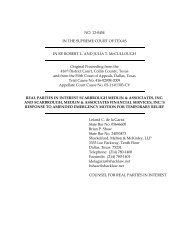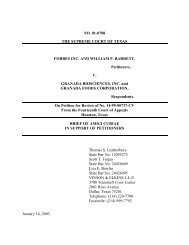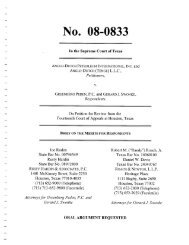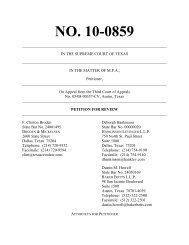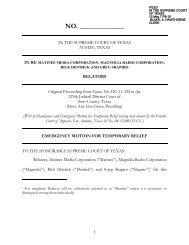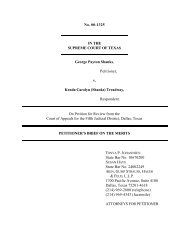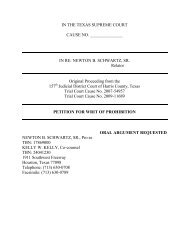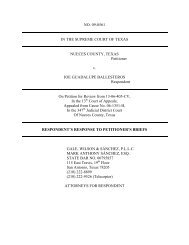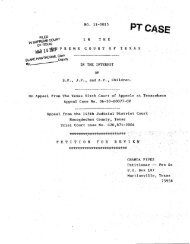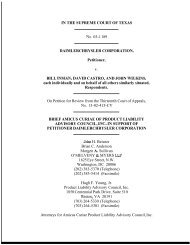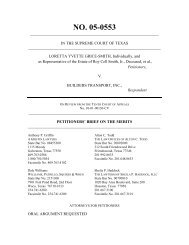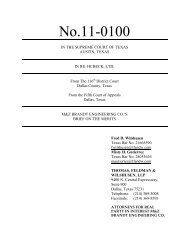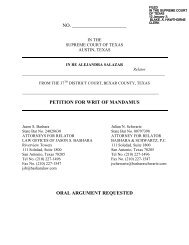Petition for Writ of Mandamus - Filed - Supreme Court of Texas
Petition for Writ of Mandamus - Filed - Supreme Court of Texas
Petition for Writ of Mandamus - Filed - Supreme Court of Texas
Create successful ePaper yourself
Turn your PDF publications into a flip-book with our unique Google optimized e-Paper software.
elationship to the value <strong>of</strong> the Privilege.<br />
20. The assignment <strong>of</strong> a tax rate <strong>of</strong> 0.5% to retailers and wholesalers, and 1.0% to all<br />
other taxpayers, is unreasonable in the same respect.<br />
See id, § 171,002. Retailers and<br />
wholesalers exercise the same Privilege, and not one-half <strong>of</strong> the Privilege, as all other taxpayers.<br />
The imposition <strong>of</strong> a tax rate <strong>for</strong> certain taxpayers that is one-half the tax rate <strong>for</strong> other taxpayers,<br />
in exchange <strong>for</strong> the same Privilege, fails to exact a tax commensurate with the value <strong>of</strong> the<br />
Privilege.<br />
B. The Margin Tax Violates the Equal Protection Clause <strong>of</strong> the United States<br />
Constitution<br />
21. The Equal Protection Clause commands that no state shall "deny to any person<br />
within its jurisdiction the equal protection <strong>of</strong> the laws." U.S. CONST. amend. XIV, § 1. It <strong>for</strong>bids<br />
a state from treating differently persons who are in all relevant respects alike. Nordlinger v.<br />
Hahn, 505 U.S. 1, 10 (1992). With regard to state taxation, the Equal Protection Clause <strong>for</strong>bids<br />
disparate treatment <strong>of</strong> taxpayers that has no rational basis or that is palpably arbitrary.<br />
Allied<br />
Stores <strong>of</strong> Ohio v. Bowers, 358 U.S. 522, 527 (1959). Any disparate treatment must rest upon<br />
some ground or difference having a fair and substantial relation to the object <strong>of</strong> the legislation.<br />
Id. The relationship <strong>of</strong> the classification to its goal must not be so attenuated as to render the<br />
distinction arbitrary or irrational. Nordlinger, 505 U.S. at 11.<br />
22. Thus, pursuant to the Equal Protection Clause, the Margin Tax may not treat<br />
differently persons who are in all relevant respects alike. Any classifications imposed by the<br />
Margin Tax must have a rational basis and must be fairly and substantially related to the object<br />
<strong>of</strong> the tax—to tax the value <strong>of</strong> the Privilege. See Nat'l Bancshares Corp, 584 S.W.2d at 270;<br />
Gen. Dynamics Corp., 547 S.W.2d at 257-58; Rylander v. Fisher Controls Intl, 45 S.W.3d 291,<br />
293 (Tex. App.—Austin 2001, no pet.).<br />
7



